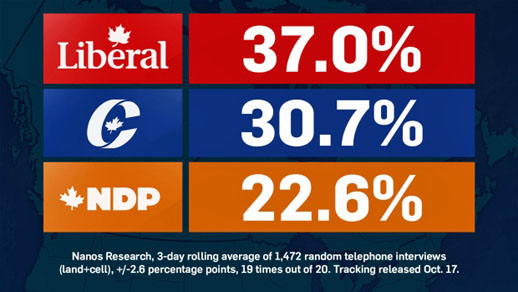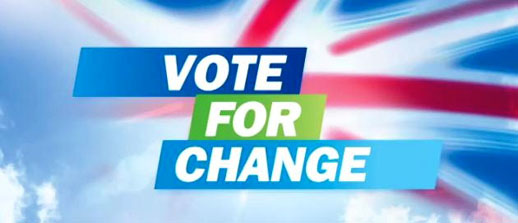
The notable figure in the Nanos Research poll above is not the fact that Justin Trudeau and the Liberals maintain a near seven-point lead over the fusty, Canadians ain’t gonna be returning ’em to office Stephen Harper-led Conservatives, but at 22.6% in the polls, the utter collapse of the New Democratic Party campaign, not just in the waning days of the 42nd federal campaign for national office, but over the course of the past seven weeks.
Today on VanRamblings, a glancing blow at just what happened to the New Democrats this past 76 days, why Tom Mulcair and the NDP seem to have lost favour with the voting public, and how it is that Canadians no longer see the New Democratic Party of Canada as the agents of change party, but rather a national political party promising more of the same old, same old.

If you ask Rick Salutin, current Toronto Star columnist, longtime Globe and Mail columnist, and for more than 40 years the authoritative voice of the left in Canada, Mr. Salutin would chock the NDP campaign collapse up to Tom Mulcair’s and the New Democratic Party’s essential mean-spiritedness, a lack of respect for Justin Trudeau, the leader of the Liberal party, and a neoliberal NDP campaign that pitched to right, promising a succession of balanced budgets and a social and economic plan that would take at least ten years to implement, and would require the uncertain support of the provincial and territorial premiers from sea to sea to shining sea.
“Justin Trudeau has withstood a pummeling that wasted the two previous Liberal leaders so badly that each broke down publicly during their campaign under the scorn and humiliation. Trudeau survived and overcame. You wanted a narrative?” writes Salutin.
“A major weapon was referring to him only as Justin, as if he was nine. Sort of first-naming and shaming. Thomas Mulcair of course was Mr. Mulcair, like your math teacher. This may have overreached. ‘He’s 43! barked a high school student I know, as if nothing more needed saying. Forty-three is senior enough for anyone under that age.”
“Mulcair could have expressed revulsion at the scuzzy tone of the assaults on Trudeau, which I think would have been politically astute. Instead he piled on, calling Trudeau, ‘Justin’, in the debates and running ads saying ‘I’m ready,’ which made him sound like Harper’s poodle. It was a sad denouement for someone who’d made many forceful sallies against Harper during Question Period — though it’s richly dramatic in terms of plot line. It reached a nadir at the Munk debate when Mulcair said Trudeau needs others to write his lines for him — even though Mulcair himself has clearly been coached on how to behave and which level to calibrate his smile at. Trudeau replied that we’ve had 10 years of personal slurs from Harper and we don’t need more.”
“I fully expect the Liberals to screw us over if they win. Liberals always break your heart after the election. It’s conventionally known as running from the left and governing from the right. The NDP, on the other hand, has taken to breaking our hearts before the election.”
While Justin Trudeau appealed to the angels of Canadians’ better nature, in what appears less than 48 hours before election day to be a winning campaign of hope that will see him become Canada’s next Prime Minister, Mr. Mulcair piled onto Harper’s campaign, aimed at the annihilation of the Liberal leader — in 2015, Canadians have clearly had enough of the politics of personal destruction, as the Tory campaign has engaged in divisiveness and the politics of xenophobia and racist provocation, while Mulcair, and the New Democrats, has continued to rely on the Just Not Ready narrative.
Then there’s the listless, too-safe-by-far and, at least of late, unfocused nature of the New Democratic Party campaign, with NDP leader Tom Mulcair no longer seen as the effective and necessary agent of change, waging an uninspiring protean and prosaic campaign that seems only to say to Canadians, “Well, gosh, we’re just darn better than the other guys.”
Honestly, what is the real difference between the Liberal and New Democratic Party campaign platforms? Mr. Trudeau has made a more compelling and — and as left-wing gadfly and columnist Terry Glavin writes in his Ottawa Citizen column — more rousing argument for change …
“You don’t have to drill down through the finer points of the NDP and Liberal campaign platforms to notice that the few substantial differences in their economic and spending policies can be read in such a way as to situate the Liberals to the left of the NDP. The foreign policy and domestic policy notes on everybody’s election concertinas are in the same key. Terrorism, citizenship revocation, niqabs, trade policy, Syrian refugees and the parties’ tireless wooing of ethnic votes have ended up being at least as entertaining as the competing bread and butter tunes all three parties were hoping to play. But between Mulcair and Trudeau, it’s Trudeau’s renditions that are proving the most rousing.”
Glavin then goes on to write about Trudeau’s inspiring leadership …
“While Mulcair gives the impression of mostly being aggravated by the Conservatives’ deucedly fiendish campaign chess moves, Trudeau relishes the fight, insisting that what is at stake are inviolable frontiers that decent societies must never allow to be crossed. Hallowed boundaries circle the dignity of the individual and the rights of citizenship, Trudeau will tell you, and fleeting assumptions about the civic good or national security, no matter how popular, must not be permitted to trespass across them.”
“That’s the sterner stuff of liberal idealism. It is a devil of a thing to champion effectively at the best of times, but it is the difficult philosophical standpoint that Trudeau has been most vigorously and extemporaneously defending. What does Mulcair stand for again? What does Harper stand for?”
While it is true that Tom Mulcair and the New Democrats have not necessarily made any discernible faux pas during the course of the 42nd national election campaign, Tom Mulcair and the New Democratic Party of Canada have failed to galvanize their initial support as the best alternative to a tired and out of touch Conservative Party — which is too bad, really.
For, make no mistake, Tom Mulcair and the New Democrats — even given the lacklustre nature of their campaign, and their utter failure to inspire the imaginations of Canadians on the topic of a fairer Canada — remain the singular party of principle on the national scene, the one federal and provincial political party that will always, always, always support and further the aspirations of working Canadians for a better future for themselves and for their families, and in the process … a better Canada.

On Monday, October 19th make your voice heard. As we’ve written previously, consult with Éric Grenier’s threehundredeight.com, and make sure that you cast a ballot for the Liberal or NDP candidate in your riding who will best be able to defeat the Conservative candidate on the ballot.